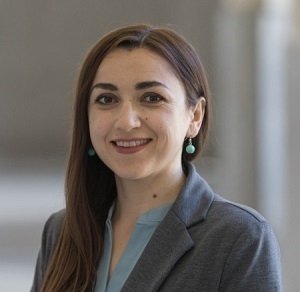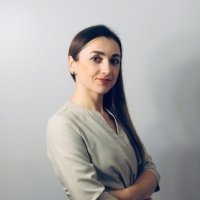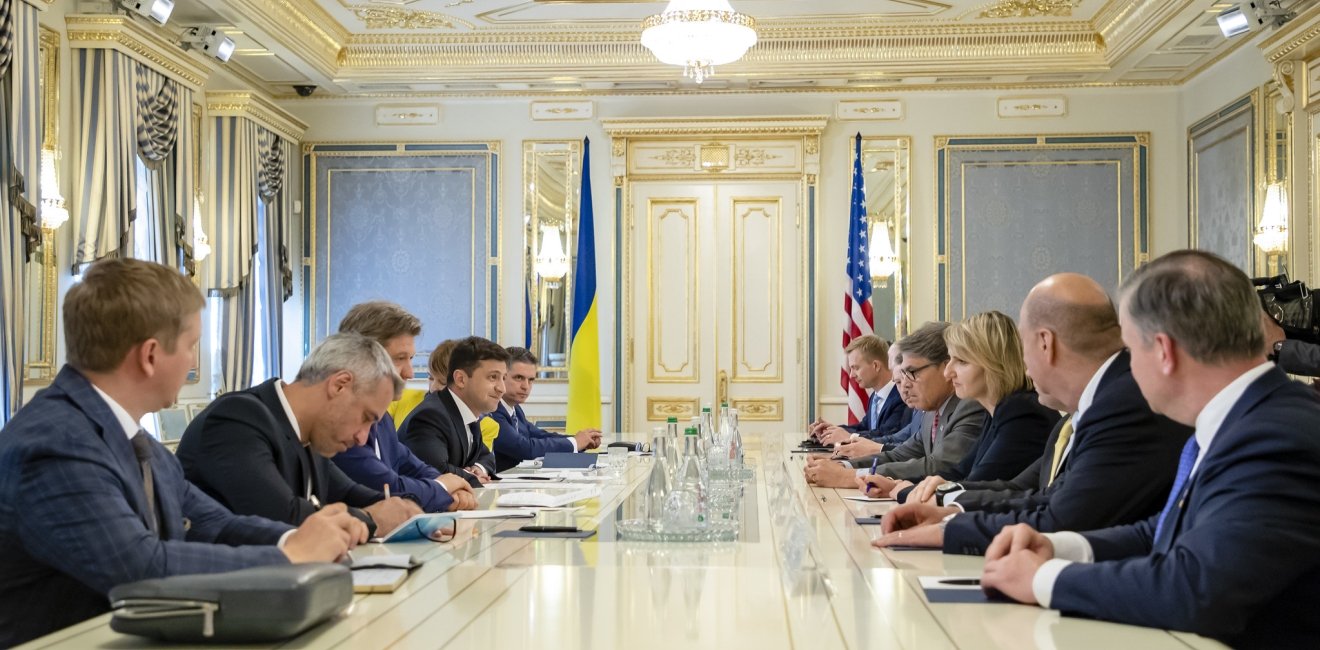Olena Lennon was a Title VIII Short-Term Scholar with the Kennan Institute who focused her research on the relationship between Ukrainian advocacy groups in the United States and U.S. policy makers. She is also an Adjunct Professor of Political Science and National Security at the University of New Haven.

Q: Describe your background and what brought you to the Wilson Center
Born and raised in Ukraine, I first came to the U.S. as a Fulbright scholar to obtain a master’s degree in Educational Administration. I later earned an interdisciplinary Ph.D. in Educational Leadership and Higher Education, with minors in Statistics and International Relations. On completion of my Ph.D., I moved back to Ukraine to fulfill my Fulbright obligations. I returned to the U.S. shortly before the onset of the Maidan revolution in November 2013 and the ensuing war in eastern Ukraine. With my family remaining in the active war zone, I kept my finger on the pulse through direct communication with people on the ground, local media outlets, and frequent visits.
In January 2015, University of New Haven’s Political Science department invited me to teach undergraduate courses in International Relations and U.S. Foreign Policy. My teaching portfolio has since grown to include Conflict Resolution, Comparative Politics, Political Economy of Russia, and Social Statistics. Ukraine has remained in the center of my research, specifically with regard to the issues of conflict management, identity politics, and political legitimacy. My work appeared in Foreign Affairs, The National Interest, Nationalities Papers, Eurasian Geography and Economics, Journal of Political Risk, Yale Global, Demokratizatsiya, and others.
Since the inception of the war in Ukraine, I got involved with various Ukrainian advocacy groups in the U.S. and found the network a fascinating phenomenon in terms of both scale and scope. As a recently naturalized U.S. citizen that “joined” the Ukrainian diaspora during the Russo-Ukrainian war, I witnessed one of historic peaks of diasporic political mobilization.
While the Ukrainian diaspora has always been active in the U.S. — and Ukraine has been fortunate to have had its supporters in the U.S. government, Congress, think tanks and NGOs since its independence in 1991— in the last five years, because of Russia’s invasion of Ukraine, the network of “friends of Ukraine” has evolved. It consists of various community organizations, foundations, business associations, think tanks, activists, political leaders, academics, pundits, and a broad range of volunteers with and without ethnic/cultural links to Ukraine. Support for Ukraine has also become one of few foreign policy issues on which there has been bipartisan consensus in the U.S., especially in matters related to anti-Russia sanctions and military aid to Ukraine. The role of “friends of Ukraine” cannot be underestimated in facilitating that level of support in the U.S. Congress.
One of the most ardent champions of Ukraine among high-ranking officials in the U.S. was the late Senator John McCain. His passing in 2018 created much concern among Ukrainian advocates as to who might replace him in championing the Ukrainian cause in Washington, D.C. Senator McCain’s passing also came at a time when Ukraine was preparing for the 2019 presidential election and violence in the country’s east continued to unravel. These dynamics created much uncertainty and anxiety about new actors and priorities in the U.S.-Ukraine policy-making realm.
These developments led to my interest in studying the dynamics of the Ukrainian advocacy network further to capture participants’ reflections on their experiences with advocating for Ukraine in the U.S. as well as their perceptions of the new challenges and opportunities going forward. In my professional journey, I have encountered many prominent Wilson Center scholars and have benefited from their scholarship in my own research. This led to my decision to apply for a Kennan Institute Title VIII-Supported Short-Term Grant to interview Ukrainian advocates in the Washington, D.C. area. I was fortunate to have been awarded an opportunity to be a part of the community of world-class scholars and receive access to the world’s best libraries and databases.
Q: What project are you working on at the Center?
My current research is a qualitative study that examines the relationship between Ukraine’s various advocacy groups in the U.S. (predominantly in the Washington, D.C. area) and U.S. policy makers. The study explores the two-fold nature of this relationship: on the one hand, Ukraine’s advocates trying to inform and influence U.S. foreign policy in pursuit of specific goals related to the Ukraine-U.S. relationship, and on the other, the U.S. representatives mobilizing the support of ethnic communities as a voting constituency or to garner support for a particular policy they favor. Within this relationship dynamic, I analyze ways in which the interests of Ukrainian advocates and U.S. policy makers may converge and diverge. I analyze this convergence and divergence from two analytical approaches: essentialist and constructivist.
The essentialist perspective assumes that various advocacy groups have pre-determined goals pertinent to Ukraine’s national interest, the group’s specific interest, the U.S.’s national interest as a function of its relationship with Ukraine, or any combination of the above. In this scenario, the relationship is based on finding overlapping interests. The second, constructivist, perspective assumes that convergence and divergence of goals happens as a result of the give-and-take democratic processes, including lobbying, in which various levers of persuasion, influence, and trade-offs are utilized in pursuing specific goals. In this relationship, the actors’ positions are more fluid and negotiable.
While the Ukrainian diaspora’s political activism is not a new phenomenon, in the last five years, since Russia’s invasion of Ukraine in 2014, Ukraine’s advocates in the U.S. have become a more diverse, active, and cohesive network of multiethnic, multigenerational, and multilingual actors that can collectively be described as “friends of Ukraine.” Its members are not only individuals with familial ties to Ukraine, of any degree or generation, but other sympathizers, especially among other East European ethnic diasporas in the U.S. (including the Russians). In addition to supporting the people of Ukraine in their fight for independence, they use the Ukraine advocacy space as a platform for raising awareness about the Russian government’s threat not only to Ukraine, but also to the U.S., Europe, and Russia’s “near abroad.” I limit my inquiry to Ukrainian advocacy groups residing in the U.S., although I am aware that the “friends of Ukraine” network is fluid and transnational. Given the changes brought about by the election of Volodymyr Zelenskyy as the new president of Ukraine in March 2019, my study seeks to understand the perceptions among Ukraine’s advocates in the U.S. of the new challenges and opportunities they face in the new political climate.
Q: How did you become interested in your current research topic?
Coming to the U.S. as a Fulbright scholar afforded me a unique insight into and appreciation for U.S. public diplomacy as one lever of its foreign policy vis-à-vis Ukraine and other East European countries. As a Ukrainian scholar who directly benefited from the U.S. Department of State’s scholarship and someone connected to the network of other Ukrainian scholars, I was aware of the impact of American foreign policy, specifically its use of soft power, on Ukrainian society. Yet, at that time, I was not aware of the domestic forces that drove U.S. foreign policy and the role of the Ukrainian diaspora in raising American public’s awareness of, shaping popular narratives about, and, ultimately, informing U.S. policy toward Ukraine.
On completion of my Ph.D. in 2010, I moved back to Ukraine, where I lived for almost three years before I moved to the U.S. to make it my permanent home in the fall of 2013. Shortly thereafter, Russia invaded Ukraine and my family ended up trapped in a war zone. I quickly got connected with other Ukrainians in the New England area to find ways to help the people of Ukraine in any way we could. The network of people concerned about helping Ukraine had quickly grown beyond ethnic and cultural groups to a diverse mix of individuals and organizations that could be broadly identified as “friends of Ukraine.” To me the network did not only provide a way of staying connected and engaging with Ukraine while living in the U.S., but also afforded an avenue for engaging with my elected representatives as a naturalized American citizen. As a scholar, I also found the network fascinating from a social/political mobilization theory point of view.
Another unique development related to the dynamics of U.S. foreign policy was the fact that since Russia’s invasion of Ukraine in 2014, support of Ukraine had been one of few foreign policy issues that had enjoyed bipartisan support in the U.S. Congress. Thus, the greater Ukrainian network in the U.S. had demonstrated an ability to mobilize its resources to not only provide the people of Ukraine with tangible assistance (financial aid, equipment, etc.), but also maintain a sense of urgency in the American policy-making space, raise the American public’s awareness of the war in Ukraine, shape the political discourse related to Ukraine, and influence U.S. foreign policy vis-à-vis Ukraine and Russia. My experiences with and observations of the network piqued my interest in studying the phenomenon of Ukrainian advocacy further from the standpoint of diasporic political mobilization and network theory of social capital.
Q: Why do you believe that your research matters to a wider audience?
Since Russia invaded Ukraine in 2014, both chambers of the U.S. Congress stepped up their level of activity on Ukraine to unprecedented levels, both reflecting and encouraging Ukraine’s rise as one of few foreign policy issues that enjoys broad bipartisan support. The role of the greater Ukrainian community in the U.S. in advocating for legislation in support of Ukraine cannot be downplayed. In the last five years, “friends of Ukraine” in the U.S. have demonstrated a unique network mobilization model, not only increasing in their influence on public awareness and political discourse related to the events in Ukraine, but also influencing the U.S. foreign policy. In 2014 alone, two major pieces of legislation were passed— the Support for the Sovereignty, Integrity, Democracy, and Economic Stability of Ukraine Act and the Ukraine Freedom Support Act. It is a rare occurrence in the U.S. Congress to have two major laws devoted to a single country passed within a year.
Another dimension to Congress’s increased engagement with “friends of Ukraine” is a reflection of constituent politics, i.e. creating a mutually-beneficial relationship with a highly-mobilized ethnic constituency. Further study of Ukrainian advocacy is thus relevant and important to a wider audience not only as a unique case study of network mobilization and constituent politics, but also as one that provides a deeper insight into the role and mechanics of ethnic communities in shaping foreign policy. The study may thus inform and promote increased participation of other ethnic constituencies in the U.S. in creating inclusive policy-making and informing foreign policy priorities of the U.S. government, while staying engaged with their countries of origin. A better informed Congressional involvement in foreign policy will create an additional check on the Executive Branch to inform and encourage the Administration to adopt sensible policies vis-à-vis our allies and adversaries around the world.
Q: What is the most challenging aspect of your research?
The most challenging aspect of my research is disassociating my personal involvement in Ukraine’s advocacy network from empirical data collected from expert interviews. As a first-generation Ukrainian immigrant in the U.S., I have to acknowledge and deconstruct my own potential biases given my personal and professional experiences with the object and population of my research. However, those experiences also afford an intimate understanding of the issues under study, and will, hopefully, enrich my analysis.
Q: What do you hope the impact of your research will be?
I hope my research will complement existing literature on identity politics in American domestic and foreign policy, as well as illuminate processes by which human networks mobilize to create political change. Additionally, I hope my study will help debunk some of the myths associated with the Ukrainian diaspora, especially its alleged ethno-centricity and nationalist politics. The “traditional” Ukrainian diaspora has been instrumental in energizing and sustaining a larger, more diverse network of “friends of Ukraine,” including first generation Ukrainian immigrants, Ukrainians residing in the U.S. temporarily (on student or work visas), other East European diasporas and various non-Ukrainians, that have been advocating for Ukraine on multiple fronts — political, academic, cultural, journalistic, and others.
I hope the study will provide an opportunity for the network to self-reflect, reassess its efforts, reenergize, and recalibrate to increase its efficiency and effectiveness in informing U.S. policy making, facilitating the U.S.-Ukraine relationship, as well as assisting the people of Ukraine to meet their daily needs as the country fights to strengthen the rule of law in all aspects of its life. Lastly, I hope the study will help keep Congress’s attention on Ukraine deliberate and informed.
The opinions expressed in this article are those solely of the authors and do not reflect the views of the Kennan Institute.
Author

Adjunct Professor of Political Science and National Security, University of New Haven

Kennan Institute
After more than 50 years as a vital part of the Wilson Center legacy, the Kennan Institute has become an independent think tank. You can find the current website for the Kennan Institute at kennaninstitute.org. Please look for future announcements about partnership activities between the Wilson Center and the Kennan Institute at Wilson Center Press Room. The Kennan Institute is the premier US center for advanced research on Eurasia and the oldest and largest regional program at the Woodrow Wilson International Center for Scholars. The Kennan Institute is committed to improving American understanding of Russia, Ukraine, Central Asia, the South Caucasus, and the surrounding region through research and exchange. Read more

Explore More
Browse Insights & Analysis
Infographic | Russia's Illegal Annexation of Crimea

Talking to the Dead to Heal the Living


